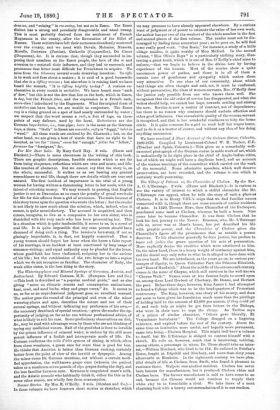we may presume to have already appeared elsewhere. By a
curious want of judgment or of power to estimate the value of her own work, the author has put two of the weakest of the whole number in the first and second places of the first volume. Tho reader must not be dis- conraged by finding these somewhat poor ; as he goes on, be will find some really good work. " Our Rosie," for instance, a study of a little village maiden, is quite worthy of Miss Mitford. In the second volume, "Miss Olive's Boys" is a particularly striking story, illus- trating a great truth, which it is one of Mrs. O'Reilly's chief aims to enforce,—that we begin to believe in the divine love by having experience of the human. Most of the stories show a quite uncommon power of pathos, and there is in all of them a certain tone of gentleness and sympathy which makes them very attractive. To one class of our community, about which hard things are often thought and said, not, it must be confessed, without provocation, the class of women-servants, Mrs. O'Reilly does the justice only possible from one who knows them well. She recognises that the old order of service has disappeared, and what she writes should help, we cannot but hope, towards settling and raising the new. Service is now a matter of contract, not of dependence; but there is no reason why contracts should exclude affection and other good influences. One remarkable quality of the woman-servant is recognised, and that is her wonderful readiness to help the home circle. It is quite common for a girl to send half her wages home, and to do it as a matter of course, and without any idea of her doing anything uncommon.
We have received A Short Account of the Outrant Statue, Ca/curia, 1860-1876. Compiled by Lieutenant-Colonel W. II. Tucker, C.E. (Thacker and Spink, Calcutta.)—This gives us a remarkably well- executed photograph of the Outram statue (a noble work of art, which is undoubtedly in its right place in the chief of Anglo-Indian cities, but of which we might well have a duplicate here), and an account of the various meetings of the committee which carried out the work of the memorial. Some admirable speeches, which well deserve preservation, are here recorded, and the volume is one which is certainly worth possessing.


































 Previous page
Previous page